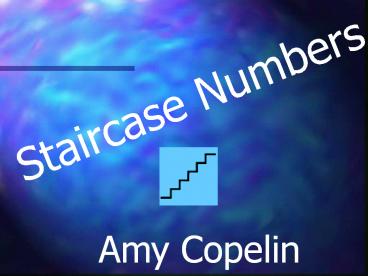Staircase Numbers - PowerPoint PPT Presentation
1 / 14
Title:
Staircase Numbers
Description:
For example 15 is a stair case number because ; 1 2 3 4 5 = 15. 15 ... This mean that numbers such as 7 and 9 are stair case numbers. 3 4 = 7. 4 5=9 ... – PowerPoint PPT presentation
Number of Views:49
Avg rating:3.0/5.0
Title: Staircase Numbers
1
Staircase Numbers
Amy Copelin
2
Contents
- Introduction
- Consecutive Numbers
- Number patterns I found , and ones I couldnt
- Staircase shape
- Conclusion
3
Introduction
- A staircase number is the number of cubes needed
to make a staircase, which has at least two steps
with each step (other then the first) being one
cube high.
- During my investigation I tried to create many
equations and find countless patterns within
staircase numbers, in most cases I was
unsuccessful.
- In my presentation I will explore 3 avenues of
staircase numbers. These being
- Consecutive numbers
- Number patterns
- Staircase shape
4
Consecutive Numbers
A staircase number is made up of the sum of a
series of consecutive numbers. For example 15 is
a stair case number because 1 2 3 4 5
15.
15
5
Consecutive Numbers (cont.)
A staircase does not have to start at 1 block
high. This mean that numbers such as 7 and 9 are
stair case numbers.
3 4 7
4 59
6
Number Patterns
Throughout my investigation tried to find number
patterns which existed within the staircase
numbers. I focused on two aspect of number
patterns. Theses being
- Number patterns that can assist in creating a
equation
- Staircase numbers an the relationship with the
number 3
7
Creating an Equation
I tried to create equation which would allow me
to evaluate how many blocks I would need, to
create a specific set of stairs, without having
to draw a replica. For example, I wanted an
equation which could tell me how many blocks I
would need to create a stair case that was 5
blocks high. To do this I drew a diagram of each
staircase up to the level 5. My aim was to work
out if there were any correlation between the
staircase level and the number of blocks in each
staircase.
8
Creating an Equation (cont.)
1 step high 1 block
4 steps high 10 blocks
2 steps high 3 blocks
5 steps high 15 blocks
3 steps high 6 blocks
9
Relationship with the number 3
- When I was looking at a list I had crated of
stair case numbers I noticed that there was a
strong correlation with stair case numbers and
the number 3.
- I noticed that there was a large number of
staircases which were divisible by 3. I next
decided to write a list of staircase number to
see if a pattern existed with this
10
Relationship (cont)
The following numbers are staircase numbers,
starting with 1 step high and continuing until 15.
1, 3, 6, 10, 15, 21, 28, 36,
45, 55, 66, 78, 91, 105, 120
11
Staircase Shape
When looking at staircases I noticed that the
shape remained the same, even when the number
became larger
12
Shape (cont).
The staircase shape remained the same, even one
it was rotated 90 degrees to the right.
The shape is now reversed, however it is still
the same
13
Shape (cont)
By creating a new staircase and rotating it 180
degrees to the left, it then creates a rectangle
14
Conclusion
I enjoyed working with this investigation. I
found hard to get started because I was not use
to such open investigations. I found that once I
got one idea, more started to flow. The open
investigation taught my new ways of looking
problem and investigations and they force you to
keep an open mind I am sure that there are may
equations for staircase numbers but I know I
didnt have the patience to continue looking.

